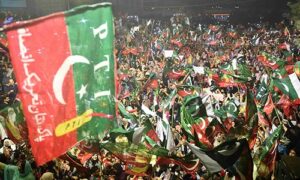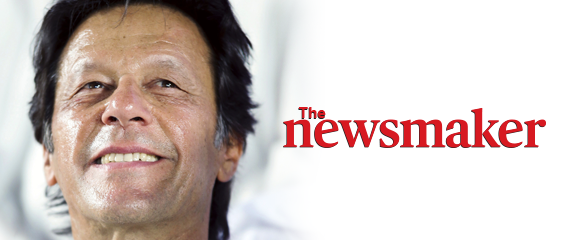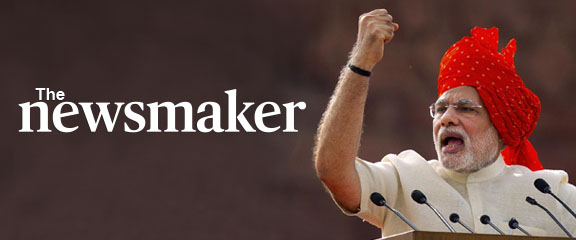The template for change currently underway, is one never before witnessed in Pakistan’s chequered political history. Never before has a ruling party lost its allies and lawmakers in droves to the opposition camp, as did the Tehreek e Insaf in the run-up to the no-confidence motion against Imran Khan. Never before have the apex courts opened for business on a Sunday, or at midnight, to decide a case against a sitting government, as happened in April 2022.
The chain of many firsts doesn’t end there. Never before in Pakistan’s history have a father-son duo managed to grab, in one go, the country’s two most coveted public offices — those of Prime Minister and Chief Minister of the country’s biggest province, the Punjab — giving the suffocating grip of dynastic politics in this land of the pure a new twist and meaning. This is also the first time that two individuals accused of massive corruption and out on bail, have managed to acquire power, as all the institutions – from the judiciary to the anti-graft investigation agencies, and the mighty military establishment — looked the other way.
In the new federal cabinet, the number of ministers currently on bail in corruption cases surpasses those with clean records. Meanwhile, the quorum of the National Assembly remains incomplete, with more than 120 PTI lawmakers having tendered their resignations in protest against what they maintained was the dubious manner in which the change of government had been brought about. And yes, these two are also among the many firsts recorded in this process of change, which has left Pakistan deeply polarised and teetering on uncertain ground.

A new government has been put in place, but its legitimacy was being questioned even before birth, thanks to widespread allegations by the PTI and its devotees, of the buying and selling of lawmakers and allies, which they contended engineered regime change, and the claims by former PM Imran Khan that the change had been orchestrated at the behest of the United States.
Such perceptions have increasingly gained currency, and resulted in the rapidly declining support for Imran Khan preceding his ouster, soaring overnight to an unprecedented high across Pakistan, with passionate crowds in tens of thousands attending PTI rallies and spontaneous protests. This jazba e junoon (spirited passion) is in stark contrast to the grimness of the mood prevailing in the country’s power centres.
Pakistan’s most revered institutions, the Pakistan Army and its judiciary are under intense criticism, the first from its own popular support base. This has never happened in the past. But today many Pakistanis think that the institutions’ traditional neutrality has tilted — and that too in favour of corrupt politicians.
This is an unprecedented crisis, which has put the credibility of Pakistan’s entire system at stake, and has the potential to snowball into full-blown confrontation among the key power players.
The new political order lacks credibility because the majority of its front-line leaders are seen as the living symbols of all that is wrong with Pakistan — corruption, nepotism, misrule, poor governance and oppressive, undemocratic dynastic politics. The new coalition government, comprising once rival political forces, including the Pakistan Muslim League-Nawaz (PML-N), the Pakistan People’s Party (PPP), the Jamiat Ulema-e-Islam-Fazl (JUI-F) and smaller sub-nationalist and ethnic parties, has not been able to instil confidence in the people about its ability to march the country to a better future, let alone pull it out of the political mess it has been subjected to by the powers-that-be.
This is for good reason. Even at the inception of its journey, it is glaringly evident that the members of the coalition now at the helm of power, are not on the same page. Prime Minister Shahbaz Sharif wants to stay in power, at least till the current assemblies complete their term. The PPP, which has the Sindh government in its pocket, would also like to do the same. But from within the ranks of the PML-N and its other allies, heard emanating are murmurs demanding early elections in the country, ironically the same demand made by the opposition PTI.
So far there has been no firm announcement about the duration of the current set-up. Shahbaz Sharif would, of course, like to do away with the corruption cases against him and his family, defang the National Accountability Bureau and reverse the electoral reforms introduced by the previous government. However, all this appears easier said than done, as Imran Khan is mounting public pressure through massive rallies across Pakistan. The PTI jalsas in Peshawar, Karachi and Lahore drew huge, passionate crowds. And in the coming weeks, Imran Khan is likely to build even more pressure through agitation and protest to press for his demand of early elections.
In the process, Imran Khan is reviving his political fortune. The hitherto growing criticism of his poor economic management, double digit inflation, and appointment of questionable team members to important positions, has all been blown away because of the manner in which he was removed from power.
Now people see him as the only leader standing up to the status quo, corrupt politicians, vested interests and even the United States and its dictates. It is also a fact that currently Imran Khan is the only national level leader who is not seen from the prism of any province or ethnic group. His popularity and following is nation-wide.
The new coalition meanwhile, is mired in a proverbial Catch 22 quagmire. Early elections mean facing a politically rejuvenated Imran Khan, riding high on a tsunami of popularity, the magnitude of which, as Khan himself declared, he had not witnessed before in his 26-year-long political career. On the other hand, delayed elections for the sitting government, mean leading the country at a time of a serious economic crunch, forcing it to take all those hard decisions for which Imran Khan was being criticised — from jacking up energy prices to other belt-tightening measures. The International Monetary Fund (IMF), the Western powers and their Middle Eastern allies may throw the new government an economic lifeline, but Imran Khan’s anti-west narrative will keep Shahbaz Sharif & Company on their toes.
Whatever flaws his critics highlight vis a vis Imran Khan’s politics and personality, it now seems they will likely be soon relegated to the dustbin of fleeting scandals. The Toshakhana affair, relating to official gifts made to the country under the Khan government and their purchase by the First Lady at throwaway prices, for example, is not likely to erode Khan’s fan-base. He continues to be seen as the only Mr. Clean of Pakistani politics. Alongside, he has now firmly established himself as the face of defiance and change. Resultantly, he has become the biggest headache for his political opponents and all those who colluded with them to orchestrate his ouster.
This, however, does not mean that the road ahead for Imran Khan is smooth. All the cards are stacked against him. The traditional political parties — aka the political establishment — stand united, at least in bolstering the anti-Imran Khan front. The traditional media overwhelmingly remains anti-Khan because his government squeezed funding for media houses and journalists, in contrast with the generosity of past governments, particularly that of the PML-N. The military establishment with its avowed stance of neutrality appears by its recent actions, to have decisively tilted in favour of the traditional parties — at least for now. The judiciary and the Election Commission of Pakistan have revealed their anti-PTI colours. Above all, Imran Khan’s rhetoric has pitted him firmly against the US-led western bloc.
Will Imran Khan be able to write history by overcoming all these odds? It will be a Herculean task, which appears near impossible. But Imran Khan’s fans have firm faith and believe that their hero, their captain, can perform this miracle. Many Pakistanis who remained opposed to the traditional political parties are also putting their weight behind Imran Khan. And former Prime Minister Khan also enjoys considerable popularity among the retired and serving personnel of the Pakistan Armed Forces.
In the final analysis, however, it is the system that decides. And for now Imran Khan remains at odds with the system — at both the domestic and the international level. Right now, he is their target. He is unacceptable because he remains bent upon upsetting the US-devised applecart. He wants to write new rules of the game.
Amid the prevailing uncertainty, the one issue that has clearly emerged is that Khan and his followers are now in a defining struggle, one which will decide the future of Pakistan. It can lead the country towards great chaos, crush all hopes for change, or actually lay the foundation for Imran Khan’s ‘New Pakistan.’ Early, free, fair and transparent elections will be the judge of that.
For now, Pakistan stands on uncertain ground. It is a country riven by more apprehensions and fears about the future, than hope and optimism. Unarguably, the captain’s new innings are the toughest he has ever played.



